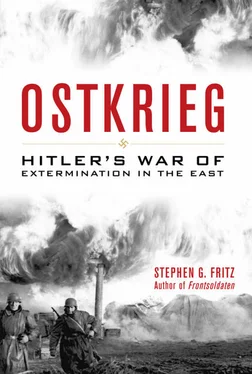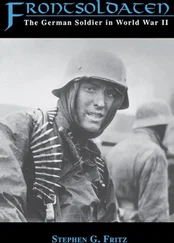Two things have combined to change this view, at least among professional historians. The first was the collapse of the Soviet Union some twenty years ago, which gave historians unprecedented access to formerly unavailable archival material. As a result, over the past fifteen years there have been, and continue to be, a number of excellent new accounts in English of the eastern war from the Soviet perspective, ranging from the detailed studies of David Glantz to the narrative overview of Richard Overy to the integrative analysis of Evan Mawdsley. All these have deepened and enriched our understanding of the conflict by providing the badly needed Russian context. At the same time, the massive ten-volume “semiofficial” history of the war initiated some four decades ago by the Military History Research Office of the German Bundeswehr has not only exploded the myth of the clean Wehrmacht by showing its complicity in Nazi crimes in the east but has also integrated the separate “wars” on the eastern front into the Vernichtungskrieg , or war of annihilation, originally envisioned by Hitler. This history having finally been completed, the interested English-language reader faces a dual problem: not only have the English translations lagged behind the German originals, but the entire ten volumes (some with two parts) run to well over fifteen thousand pages. In addition, other German historians, in investigating specific issues, have produced outstanding works on a variety of topics ranging from the decision for and implementation of the Holocaust to the larger Nazi plans for a racial-demographic restructuring of the east to the question of the continuing support for the Nazi regime.
It is important, then, to note from the beginning what this book is not. It is not a work based on primary research; rather, it is intended as a synthesis, an integrated narrative based primarily on exhaustive research by German, British, and American historians over the past two or three decades. It is also clearly told from the German perspective, with no pretense of being a balanced account of the war. My aim is to provide a deeper understanding of the complexity and immensity of the Ostkrieg by anchoring the military events of the war within their larger ideological, racial, economic, and social context. There have been many military histories and numerous other works that have highlighted the atrocities committed on the eastern front but none that have attempted to integrate the military, ideological, and economic dimensions. Without a sense of the comprehensively murderous nature of Hitler’s aims, the full scope of the eastern war cannot be grasped. The Holocaust, for example, cannot be adequately comprehended without reference either to German military success or to Nazi plans for a larger racial reordering of Europe. For all Hitler’s anti-Semitism and verbal radicalism, the Final Solution neither was intended from the beginning, nor sprang out of the blue, but evolved as a result of specific time and spatial circumstances and largely as a result of the unprecedented scale and barbarity of the German war in the east. It was the Ostkrieg that radicalized and crystallized Nazi intentions regarding the Jews, while the process of annihilation was largely determined within the context of military events. By the same token, many of Hitler’s seemingly irrational military decisions seem much more explicable when set within their larger economic or strategic context. A purely operational focus, such as has dominated narratives of the eastern front, is not merely incomplete but misleading.
Why is a book like this necessary? Despite the ongoing fascination with World War II in this country and the English-speaking world in general, there is surprisingly little on the German-Russian war and virtually nothing within the past thirty years that aims to cover the entire period 1941–1945—let alone a narrative that places the military events within a larger interpretive framework. In fact, it is not too much to say that a good bit of the genesis of this work was frustration, both with trying to find acceptable books for my World War II classes to read and with otherwise knowledgeable American readers who failed to understand the importance of the eastern front or acknowledge the inherent connection between military events and Nazi criminality. Contrary to the belief of many in the West, Hitler did not blunder into the war in the east. For him, the “right” war was always that against the Soviet Union, for to him Germany’s destiny depended on attaining Lebensraum and solving the “Jewish question.” Both of these, in turn, hinged on destroying the Soviet Union. Which of these aims was most important? Given Hitler’s views, it would be artificial to attempt to prioritize or separate them. For him, the war against “Jewish-Bolshevism” and for Lebensraum was comprehensive and of whole cloth.
I have also attempted to infuse this account with irony, paradox, and complexity—all the things necessary for comprehending history but largely absent from the prevailing American view of World War II as the “good war” (which, again, is not so much wrong as incomplete). In addition, I have aimed to reestablish the eastern front as the pivotal theater of the war. The Second World War was not won or lost solely on the Ostfront, but it was the key—while the scale of fighting there dwarfed anything in the west. In retrospect, the disproportional nature of the Ostkrieg is striking: roughly eight of every ten German soldiers who died were killed in the east; from June 1941, in no single month of the war did more Germans die in the west than in the east, and the only month that came close was December 1944 (when during a “quiet” period over ten thousand more Landsers fell in the east than on all other fronts); the Red Army, at the cost of perhaps 12 million dead (or approximately thirty times the number of the Anglo-Americans), broke the back of the Wehrmacht; total German and Soviet deaths (military and civilian) numbered around 35 million, compared with less than 1 million for Great Britain and the United States. At times, indeed, the Ostkrieg often seemed more murder than war. That it took the most murderous regime in Europe’s history to defeat its most genocidal certainly tarnishes Western notions of the good war. Nonetheless, Stalin’s alleged observation—England provided the time, America the money, and Russia the blood—contained a good deal of truth.
Why wars start, why they last so long, why they are so difficult to end, are all key questions that serious historians ask. In addition, a number of other themes infuse this work. Perhaps most important is the intersection of impulses—military, ideological, economic, racial, and demographic—that account for the violent, destructive nature of the eastern war. It was a war for hegemony, of conquest of Lebensraum, an ideological war against Jewish-Bolshevism, a war for food and raw materials, a racial-demographic war to reshape the borderlands of East-Central Europe, perhaps even a sort of colonial war in its ultimate goal of creating a vast “Greater Germany.” Each of these points reflects a valid aspect of Hitler’s war in the East and has elicited much recent research. Obtaining raw materials, for example, was regarded as vital by Hitler in his strategic goal of elevating Germany to a position of world power status. Without secure access to large quantities of key resources, a mid-sized power such as the Third Reich could never throw off its constraints and aspire to compete against the likes of Great Britain, the Soviet Union, and the United States. With it, however, a German-dominated Europe could aspire to maintain its world ascendancy. Indeed, in many respects, World War II can be seen above all as a war for oil, with those lacking it (Germany, Italy, Japan) seeking to defeat those who controlled it (Great Britain, America, and Russia). A war to secure Germany’s economic future, however, could also serve to guarantee the Reich’s racial future as well since the area targeted for expansion—European Russia—with its polyglot ethnic makeup seemed ripe for exploitation. Not for nothing did Hitler refer to it as “Germany’s India” or note approvingly the opportunities for settlement similar to America’s west. The “wild east” would be Germany’s frontier, a space within which racial demographers and economic planners could work from a blank slate—once x number of millions of native inhabitants had been resettled or killed. From the outset, the war against the Soviet Union was planned as a war of annihilation, with the full knowledge and complicity of the Wehrmacht leadership.
Читать дальше












